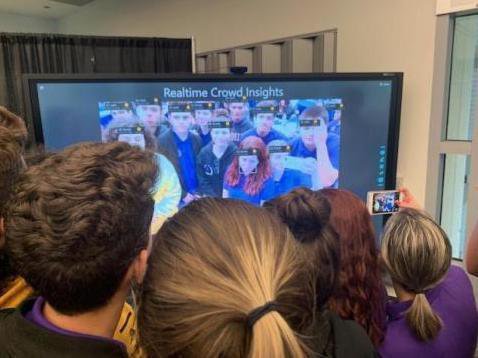
An inaugural cohort of twenty-two colleges and universities have come together in collaboration to create a playbook with lessons learned on how schools can update computing curricula to help students bring ethics and a holistic view of society to the design of technology products.
As part of the Responsible Computer Science Challenge, the participating schools and Mozilla have released the Teaching Responsible Computing Playbook that will help higher education institutions integrate responsibility and ethics into their computing curricula, ultimately driving a cultural shift in the tech industry and building a healthier internet.
Have teaching examples and feedback? Contribute to the Playbook, and join the Global Teaching Responsible Computing Community of Practice to continue the conversation and hear about events like the Teaching Responsible Computing Day Summit on July 27th, 2021.
The launch of the Playbook comes at a critical moment when computing education is booming, with a 300 percent rise in bachelors in computer science enrollment between 2009 and 2019 (CRA Taulbee Survey).
These students will wield tremendous power, according to Kathy Pham, a computer scientist, Mozilla Fellow, and co-editor of the Playbook.
“The code they write may be used by billions of people, influencing everything from which news stories we read, to what kind of personal data companies collect, to who qualifies for parole, insurance, or housing loans -- and who does not,” said Pham. “In other words, these students have the power to shape society. When that power isn’t coupled with responsibility, the results can have unintended consequences, negatively impacting users’ autonomy, privacy, security, or wellbeing, as well as causing harm to society as a whole.”
There were two main challenges to launching such an initiative: the variety of cultures among institutions, and the fact that computing faculty couldn’t design this curriculum alone. The nature of responsible computing requires input from experts in other departments, particularly humanistic studies, a field where issues of ethics and society have been studied for centuries. With this in mind, the Playbook collected contributions from more than thirty authors from different types of institutions -- liberal arts, private and public, community college, Ivy League, Jesuit, Quaker, and more. Each participating institution conceptualized, developed, and piloted undergraduate computing curricula that address the social impact of computing. The Playbook uses lessons learned from their efforts to create a framework that can be adopted by computing programs everywhere.
The Playbook is divided into twenty sections, including Working Across Disciplines, Choosing Computing Courses; Learning Outcomes and Assessments; Accreditation and Ethics, Broadening Participation and Responsible Computing, Discussing Justice and Equity and more.
Each section contains an overview; key questions for educators to ask themselves; step-by-step checklists; case studies of how participating institutions have integrated those checklists into their programs; and links to additional resources. We encourage faculty from additional institutions, especially those outside the United States, to add to this body of work; submissions are welcomed.
“It is not enough for us to think about the ethical consequences of technology designs after they’ve had a negative impact,”
said Pham
“The Playbook offers a framework for embedding ethics and responsibility into undergraduate computer science curricula — before students land jobs and start coding -- and to train the next generation to foresee how their technologies may affect humanity.”
“My main feeling about the Playbook is a sense of wonder about what we as a group were able to achieve,” said Atri Rudra, a professor in the Department of Computer Science & Engineering at the University at Buffalo, and a co-editor of the Playbook. “A couple of months back I was talking with a new colleague who is interested in responsible computing in education and they listed five or six things that they thought were important to consider, and I realized we had a section for each of those topics! Until then I’d been immersed in the logistical weeds of the Playbook, but that moment made me realize that we have created something that could potentially be great!”
Vance Ricks, Associate Professor of Philosophy, Guilford College: “The Playbook is a long-overdue, optimistic guide for a community of practitioners who want to help preserve what we most value about the Internet. Working collaboratively across disciplines and campuses with supportive colleagues has been invigorating, and models the way we believe that any kind of successful effort at ‘responsible CS’ has to look.”
Irina Raicu, Director of the Internet Ethics Program, Santa Clara University: “It's been a great pleasure and learning opportunity to collaborate with faculty from colleges and universities around the country. We all hope that the Playbook resources will prove applicable to a variety of courses and contexts and spark even more new, creative ways of integrating applied ethics across CS curricula.”
Margo Boenig-Liptsin, Human Contexts and Ethics Coordinator, Division of Data Sciences, UC Berkeley: “It's remarkable how the authors, each drawing on the specific experiences of their own institutions, came collectively to some core best practices of Responsible Computing ‘how-to.’ For example, across the board, the Playbook sections reinforce the importance of cross-disciplinary partnerships in creating and delivering responsible computing curricula. They also call for ‘spiraling’ the curriculum, so that students can see responsible computing lessons throughout the arc of their study of computing and deepen the learning with every encounter."
Ellen Zegura, Regents and Fleming Professor, School of Computer Science, Georgia Tech: “This Playbook brings together the creative ideas and learning experiences that have emerged from the Mozilla-funded community working on Responsible Computer Science. The resulting Playbook provides a wealth of practical advice for starting or advancing efforts to embed ethics into technical courses at all levels and across diverse institutional types. The section on tenure considerations recognizes the importance of fitting new faculty work into existing systems of evaluation, while also suggesting ways to nudge these systems to value this important work. “
The Playbook is a collection of learnings and best practices gleaned from the first two years of a three-year Responsible Computer Science Challenge (RCSC) initiative led by the Mozilla Foundation, Omidyar Network, Schmidt Futures, and Craig Newmark Philanthropies. RCSC has provided $3.5M in grants to 19 colleges and universities to conceptualize, develop, and pilot curricula that integrate ethics with undergraduate computer science training.


Inaugural Authors and Contributors:
Ellen W. Zegura
Georgia Tech
Joshua Young
Miami Dade College
Marty J Wolf
Bemidji State University
Jennifer Winikus
University at Buffalo
Subramaniam (Subbu) Vincent
Santa Clara University
Atri Rudra
University at Buffalo
Vance Ricks
Guilford College
Irina Raicu
Santa Clara University
Kathy Pham
Harvard Kennedy School
Alicia Patterson
Georgetown University
Michael Neff
University of California, Davis
Helena Mentis
University of Maryland
Sandra Matteucci
University in St. Louis
Xin Liu
University of California, Davis
Maggie Little
Georgetown University
Seny Kamara
Brown University
Kenneth Joseph
University at Buffalo
Matthew Hertz
University at Buffalo
Sorelle Friedler
Haverford College
George Gabb
Miami Dade College
Stacy Doore
Colby Computer Science
Antonio Delgado Fornaguera
Miami Dade College
Udayan Das
Loyola University of Chicago
Ron Cytron
Washington University in St. Louis
Cathryn Carson
University of California, Berkeley
Augustin Chaintreau
Columbia University
Quincy K Brown, Ph. D.
AnitaB.org
Oliver Bonham-Carter
Allegheny College
Margarita Boenig-Liptsin
University of California, Berkeley
Jeff Behrends
Harvard University
Nina Amenta
University of California, Davis







